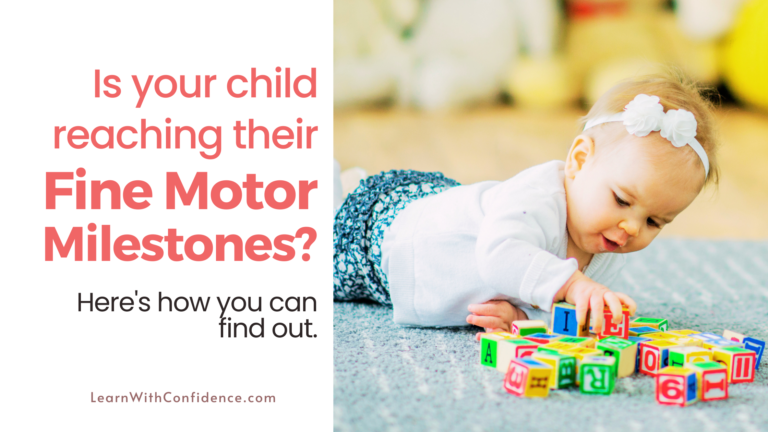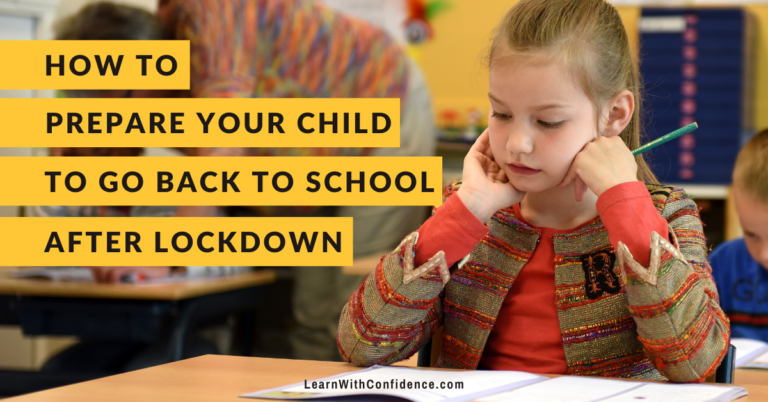10 Powerful Ways your child’s Good Self-esteem can boost their School Success.
Does your child have a good self-esteem? Struggling in school, whether with the academic work or the social relationships or the skills needed for staying organized and keeping up, can really take a toll on self-esteem. These links between good self-esteem and school success can make a huge difference to your child’s school experience!
When children have a good self-esteem they can really enjoy and thrive in school.
And that’s all you want for your kids, don’t you, Mama?
After all, they spend a lot of time there every day. And whatever you can do to make sure they can be happy and healthy and reaching their full potential… Well.. of course you’ll do it!
So, here are some ways having a good self-esteem will help your child enjoy more school success.
Why your child needs a good self-esteem.
Self-esteem is your child’s belief about themselves, their value and worth, their abilities. When your child has a good, or healthy, self-esteem they have a positive view of themselves and feel confident in their abilities.
Self-esteem influences every area of our lives. And especially for your child, their school success is often closely linked to their self-esteem.
The link between good self-esteem and school success.
According to this research, there is a significant correlation between self-esteem and academic achievement. Meaning that children with a good self-esteem often do better academically (We’re going to take a look at why in just a minute). And doing well academically, often boosts a child’s confidence and that builds their self-esteem too. It’s self-perpetuating.
But school success is so much more than just getting good grades.
The skills they’re learning there, the social interactions, what they’re learning about and growing in themselves – it’s all about preparing them for life. And if they can be successful in all these areas in school, they will not only thrive but they’ll enjoy school a lot more too. Having a good self-esteem sets them up for success in all of these areas.
And here’s why.

10 ways your child’s good self-esteem boosts their school success.
1) More willing to try new things
Every new school year there are a host of new things. New teachers, new classrooms, even new school subjects. New rules, new expectations.
And sometimes even if it’s not the beginning of a school year, your child may have the opportunity to start a new extra mural or make some new friends.
Children with a good self-esteem are able to handle the new with more flexibility and confidence because they have a good sense of themselves, they’re open to growth and trying new things. Their uncertainty about the future is not debilitating because they approach that future from a place of security in themselves and their identity.
2) Take (the right kind of) risks
Taking risks is scary business. Because it means making yourself vulnerable, putting yourself out there. And we’re obviously not talking about unsafe risks here.
But if your child wants to go and talk to a new person and invite them to join their group of friends. Or put up their hand in class because they need the concept explained again. Maybe try a new idea for a project. These are risks that are really good for your child to be willing to take.
Children with a good self esteem can take those kinds of risks more easily because they aren’t so afraid of the possible negative outcomes. Children with a poor self-esteem often need more approval and, when those risks might jeopardize that approval, they may shy away from it.
3) Set goals more easily
Setting goals and working towards them is an important skill for success in school. We want our kiddos to be able to set big goals, but this skill is for ‘small’ things too. For example, setting goals for completing the parts of a project or assignment. Setting goals for studying all the content for an exam.
When your child has a good self-esteem, they can approach setting those goals with a growth mindset that says: “I can set goals. I can achieve them when I work towards them.”
4) More likely to work toward achieving those goals
When a child believes a goal is attainable, they are more likely to try to work toward achieving that goal. It makes sense right?
Why would you even try to achieve anything if you didn’t believe it was possible to do it.
When your child has a good self-esteem they believe in their strengths and abilities. They believe in their ability to leverage their strengths to attain that goal.
5) Able to advocate / stand up for themselves
Children need to learn how to advocate for themselves: be assertive and confidently share their thoughts and opinions. Whether it’s among their peers or with the adults in their world.
In terms of school success, this may mean approaching the teacher to say that he or she struggles with sitting at the back because of their eye-sight/vision, and asking to move seats to the front. Or during a group work assignment, speaking up to select a task or topic they know they’re good at and will enjoy. It might be confronting the teacher about a discrepancy in an answer in a test. Or standing up against something they believe to be wrong.
But having the confidence to express your ideas and thoughts, your convictions and concerns, is something else! When we teach our children that their voice matters, and equip them with the words to say, they develop the self-esteem they need to advocate for themselves.
6) Bounce back from failures and set backs
Failure, struggles and setbacks are inevitable one way or another. They’re just a part of life!
It may sound like a despondent, miserable outlook. But when your child knows that failure is just a part of life, he or she is more likely to take it in their stride. Too many kiddos are terrified of their parents’ reaction to failure. And the irony is that it hinders them from trying the very things that’ll actually help them succeed!
Though none of us enjoy failures and set backs, when we’ve come out in the other side, we can comfortably agree that we grew in significant ways. We learned new lessons, we encountered new challenges and came up with new solutions, we figured out a new way around a challenging obstacle.
Having a good self-esteem allows your child to rest in the fact that they will face challenges and overcoming them is just “part of the deal”. Struggling with, or even failing at, something doesn’t define their identity. They can bounce back and try again!
7) Solve problems in new and creative ways
If your child can solve problems in creative ways, they can apply their knowledge and understanding to different scenarios and situations. And this is an important skill needed in almost every part of your child’s schoolwork. Not to mention in life!
Children with a good self-esteem know that their ideas have value and that they can try new things (even if they don’t succeed the first time). They appreciate their uniqueness; they understand their strengths. They feel confident to create in their own way and not feel insecure about what they create.

8) Face challenges rather than avoid them
Avoidance is something we do when we’re afraid we won’t succeed. Children with a poor self-esteem often focus on their weaknesses and highlight their shortcomings. This means that when faced with a challenge, the easy escape is what they will seek, because their fear of failure is greater than their belief in their ability to overcome.
If your child can see failure as an opportunity to grow, as an opportunity to test their limits and see what new solutions they can come up with, they will not mind so much to face a challenge.
Why?
Because they aren’t crippled by the “what ifs”:
- What if this doesn’t work out?
- What if I struggle with this?
- What if I make a complete fool of myself trying?
Instead, challenges become an opportunity to grow and learn and improve in the future.
9) Relate to others in a healthy way
I’m sure you’ve heard statements like these before:
- “Hurt people, hurt people.”
- “People who are bullied, bully others.”
So often, “bad” behavior comes from a place of defense because a person feels threatened or like they need to guard themselves from the possibility of being hurt.
Children whose self-esteem has been damaged, have been hurt. It may have been something serious like abuse or bullying. It may have been something “small” like a dismissive comment. It made them feel a little smaller. This influences how they interact with others in a BIG way.
Children with a good self-esteem have the confidence to be caring and assertive, kind and bold. Their worth is not defined by their popularity or the approval of others. They don’t have to behave in a certain way because they’re trying to fit in to other people’s mold.
This doesn’t mean your child has to be arrogant or proud, just confident in themselves and their identity. That confidence allows them to reach out to others, and not be afraid of uncertain outcomes.
10) Enjoy and thrive in school
Because of these 9 points above, children with a good, self-esteem are able to enjoy and thrive in school.
Their sense of security in their identity, strengths and abilities, their willingness to face challenges and setbacks, and their belief in their ability to overcome these. All of these things make life at school, interacting with peers and teachers, and completing the work, easier and more fun.
And when a child is enjoying themselves, they are more likely to thrive!
4 simple ways to build your child’s self-esteem so they can enjoy school success?
You know how important having a good self-esteem is for your child’s school success. So let’s talk about a few simple things you can do to build a good self-esteem for your child’s school success.
Develop a growth mindset.
Having a growth mindset means your child sees their intelligence, their abilities, as something that can grow, not something that is fixed. It means that they can see their strengths as something to hone and leverage and their “weaknesses” as challenges to overcome. Children with a good self-esteem often have one because they believe these things about themselves.
So, how do we do develop a growth mindset in our kids:
- Accept and normalize failure.
- Reframe challenges using “Yet”. – “I can’t do Maths….YET!”
- Speak truth, drown out the lies. – “I can’t do Maths” – “Well…Actually.. You got that whole section right in your Maths test! You can do some Maths.”
- Encourage your child. (Don’t just praise them.)
Weigh up the impact on your child’s self-esteem.
Sometimes it’s good to push our children. To try new things, to put themselves out there, to face a challenge.
Always weigh up the impact on their self-esteem.
If your child has a poor self-esteem, making them take a giant leap into something new could be VERY damaging and have the opposite effect you were going for. In this case, one tiny step in the right direction could be exactly what your child needs to repair the damage they’ve experienced and start rebuilding their self-esteem.
Celebrate successes – even the little ones!
Your child left a note of the teacher’s desk asking for help with a sum. They had the courage to put up their hand in class even when they got the answer wrong. They got a poor grade on their History paper, but they did do really well in that one small section.
As soon as we start to notice and highlight their successes, we are modelling for our children they can do the same.
Does it mean we don’t want them to excel beyond that poor grade? Of course not!
But when we’re building up self-esteem, we have to start at the bottom and work our way up. And remember, success breeds success. Kids WANT to do well! When they taste success they want more. And when they’re equipped, they work hard towards that goal!
Be patient – changing a mindset is a slow process
When we want our child’s self-esteem to improve, we want them to change the way they think about and see themselves, their abilities, their strengths and weaknesses, and the way they interact with their world!
That’s a HUGE shift!
And changing mindsets takes time because it is literally rewiring the neural pathways in your child’s brain.
So be patient, and be persistent. Keep on putting in place these other three points and you’ll start to see the shifts that your child starts to make!
And when you do, then you’ll see exactly how a good self-esteem boosts your child’s school success!
Save and Share this Post
Pin this image to your favorite parenting board on Pinterest and share it with your momma friends who also want their kids to succeed in school!


I would love to connect with you and include you in this community of Mommies as we support each other and grow together to become the best moms we can be!
Get on my email list here and I’ll make sure I keep you in the loop on all the latest blog posts, freebies and resources!






